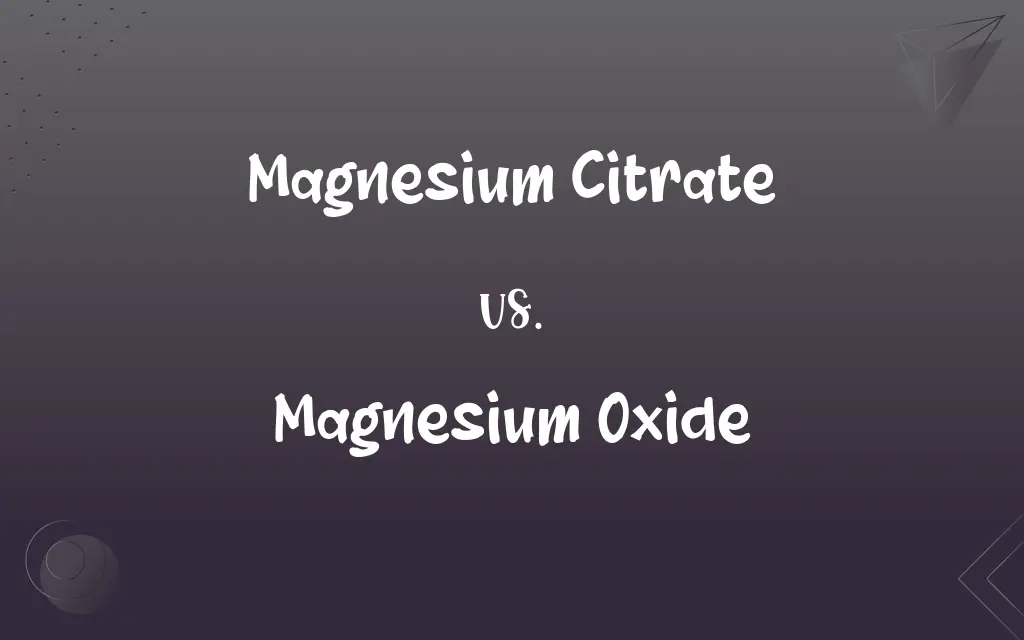Magnesium Citrate vs. Magnesium Oxide: What's the Difference?
Edited by Aimie Carlson || By Harlon Moss || Published on January 2, 2024
Magnesium Citrate is a magnesium salt combined with citric acid, easily absorbed by the body. Magnesium Oxide is a compound of magnesium and oxygen, less bioavailable but useful for treating low magnesium levels.

Key Differences
Magnesium Citrate is known for its high bioavailability, meaning the body can absorb it more easily. This makes it a preferred choice for dietary supplements. Magnesium Oxide, on the other hand, has a lower absorption rate, but it is often used for its laxative properties and to treat magnesium deficiencies.
The chemical structure of Magnesium Citrate involves magnesium combined with citric acid. This composition contributes to its higher solubility in water. Magnesium Oxide is a simple compound formed from magnesium and oxygen, making it less soluble in water.
In terms of medical use, Magnesium Citrate is frequently used as a gentle laxative and is helpful in treating constipation. Magnesium Oxide is more commonly prescribed for people with severe magnesium deficiencies, due to its higher magnesium content per dose.
Magnesium Citrate can be more beneficial for individuals looking to improve their overall magnesium levels for general health. Magnesium Oxide, despite its lower absorption, is often recommended for specific conditions like migraines or acid reflux.
The cost factor also differentiates them. Generally, Magnesium Citrate is more expensive due to its higher bioavailability and efficiency. Magnesium Oxide is usually cheaper and more commonly found in over-the-counter supplements.
ADVERTISEMENT
Comparison Chart
Bioavailability
High, easily absorbed by the body
Lower, less easily absorbed
Chemical Composition
Magnesium combined with citric acid
Magnesium combined with oxygen
Solubility
High in water
Low in water
Common Uses
Laxative, general magnesium supplementation
Treating magnesium deficiencies, laxative
Price
Generally more expensive
Usually cheaper
ADVERTISEMENT
Magnesium Citrate and Magnesium Oxide Definitions
Magnesium Citrate
A bioavailable form of magnesium combined with citric acid.
Doctors prefer magnesium citrate due to its high absorption rate.
Magnesium Oxide
A less soluble, but potent, source of magnesium.
For severe deficiencies, doctors prescribe magnesium oxide.
Magnesium Citrate
A salt form of magnesium used for its laxative effect.
Magnesium citrate is often recommended for relieving constipation.
Magnesium Oxide
A magnesium supplement often used for its laxative properties.
Magnesium oxide can also act as a laxative when needed.
Magnesium Citrate
A soluble form of magnesium used in liquid supplements.
Magnesium citrate in liquid form is easy to consume.
Magnesium Oxide
A compound used as an antacid to relieve heartburn and indigestion.
He used magnesium oxide to ease his acid reflux.
Magnesium Citrate
A compound used in medical imaging for bowel preparation.
Before his colonoscopy, he drank magnesium citrate.
Magnesium Oxide
An inorganic compound of magnesium and oxygen.
Magnesium oxide is often found in its powdered form.
Magnesium Citrate
A magnesium compound used as a dietary supplement.
She took magnesium citrate to improve her magnesium levels.
Magnesium Oxide
A mineral supplement used to maintain adequate magnesium in the body.
Magnesium oxide helps to replenish her low magnesium levels.
FAQs
What is Magnesium Citrate?
A salt of magnesium and citric acid, used as a supplement and laxative.
Does Magnesium Citrate have side effects?
It can cause stomach upset and diarrhea if taken in large doses.
What is Magnesium Oxide used for?
It's used for treating magnesium deficiencies and as an antacid.
How does Magnesium Oxide interact with medications?
It can reduce the effectiveness of certain medications if taken together.
Is Magnesium Oxide good for anxiety?
It can help in managing anxiety by maintaining magnesium levels.
Is Magnesium Oxide natural or synthetic?
It is an inorganic, synthetically prepared compound.
Can Magnesium Citrate improve sleep?
Yes, it can aid in relaxation and improve sleep quality.
Can Magnesium Oxide cause constipation?
Unlike citrate, it's less likely to cause laxative effects.
Is Magnesium Citrate safe during pregnancy?
It should only be used under medical supervision during pregnancy.
Can I take Magnesium Oxide on an empty stomach?
Yes, but it may be better tolerated with food.
Can Magnesium Oxide help with migraines?
Yes, it can be effective in reducing migraine frequency.
Does Magnesium Citrate interact with other supplements?
It can interact with calcium and other minerals.
Can Magnesium Citrate cause kidney stones?
Excessive use might contribute to kidney stone formation.
Is Magnesium Oxide suitable for long-term use?
It can be used long-term under medical supervision for chronic conditions.
Can children take Magnesium Citrate?
Yes, but in doses appropriate for their age and weight.
Is Magnesium Oxide vegan?
Yes, it does not contain animal-derived ingredients.
How quickly does Magnesium Citrate work as a laxative?
It typically works within 30 minutes to 6 hours.
How does Magnesium Oxide affect bone health?
It supports bone health by maintaining adequate magnesium levels.
Can I take Magnesium Citrate for muscle cramps?
Yes, it can help in relieving muscle cramps.
Is Magnesium Citrate better absorbed than Magnesium Oxide?
Yes, it has higher bioavailability.
About Author
Written by
Harlon MossHarlon is a seasoned quality moderator and accomplished content writer for Difference Wiki. An alumnus of the prestigious University of California, he earned his degree in Computer Science. Leveraging his academic background, Harlon brings a meticulous and informed perspective to his work, ensuring content accuracy and excellence.
Edited by
Aimie CarlsonAimie Carlson, holding a master's degree in English literature, is a fervent English language enthusiast. She lends her writing talents to Difference Wiki, a prominent website that specializes in comparisons, offering readers insightful analyses that both captivate and inform.






































































